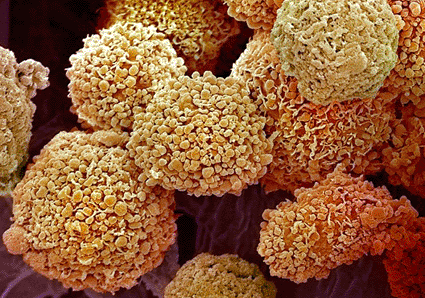Angiotensin Peptide Blocks Growth of Breast Cancer in Mouse Model
By LabMedica International staff writers
Posted on 11 Jan 2011
The seven-amino acid peptide angiotensin-(1-7) was found to inhibit growth of human breast cancer cells in a mouse model that closely mimicked the human disease.Posted on 11 Jan 2011
Angiotensin-(1-7) comprises seven amino acids with a total molecular weight of only about 900 Daltons. Its use in the current study on breast cancer was based on results of previous work, which showed that patients treated with drugs to reduce blood pressure and increase angiotensin-(1-7), also had a lower risk of developing cancer.

Image: Colored scanning electron micrograph (SEM) of breast cancer cells (Photo courtesy of Steve Gschmeissner / Science Photo Library).
Investigators at Wake Forest University Baptist Medical Center (Winston-Salem, NC, USA) created the mouse model by injecting athymic mice with either estrogen-receptor or HER2 sensitive human breast cancer cells. After tumors were established, the mice were injected with either angiotensin-(1-7) or saline for 18 days.
Results published in the November 1, 2010, issue of the journal Cancer Research revealed that the mice treated with angiotensin-(1-7) experienced a 40% reduction in tumor size as compared to the saline-injected mice, where tumors more than tripled in size. Breast tumor fibrosis also was reduced by 64% to 75% in the mice treated with the peptide as compared to the saline-injected mice.
Analysis of the results showed that angiotensin-(1-7) both directly inhibited the growth of the breast cancer cells and blocked the growth of cancer-associated fibroblasts (CAFs), cells found in the tumor microenvironment that play a vital role in tumor initiation, growth, and metastasis.
"This is the first study to show that angiotensin-(1-7) not only inhibits the growth of tumors, but also inhibits breast tumor fibrosis,” said senior author Dr. Patricia E. Gallagher, professor of vascular research at Wake Forest University Baptist Medical Center. "Think of it as a seed and the soil around it – the seed being the tumor and the soil being the fibrosis. You can attack the seed, or you can attack the soil, or do both, and our drug does both.”
"Our findings also suggest that angiotensin-(1-7) may enhance the effect of chemotherapeutic agents when administered in combination with other drugs by altering the microenvironment in which the tumor grows,” said Dr. Gallagher. "Because the safety of angiotensin-(1-7) was established here at Wake Forest Baptist in a recently completed trial in patients with different types of solid tumors, we hope to go to clinical trials for breast cancer relatively soon.”
Related Links:
Wake Forest University Baptist Medical Center













